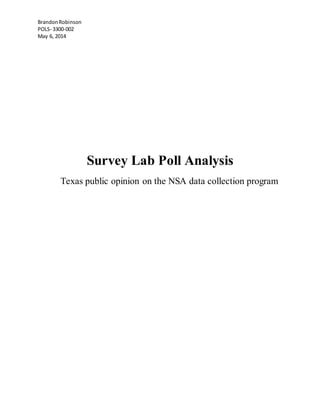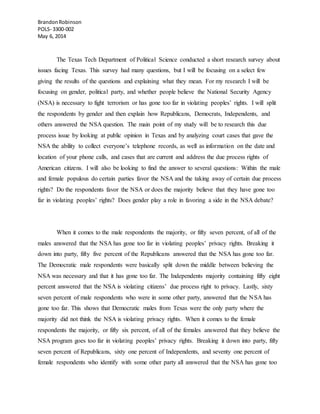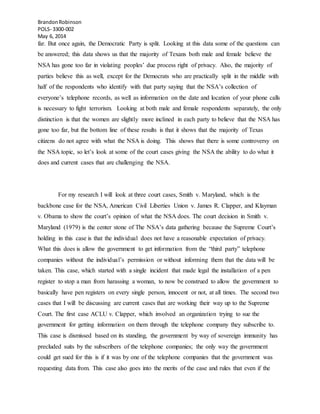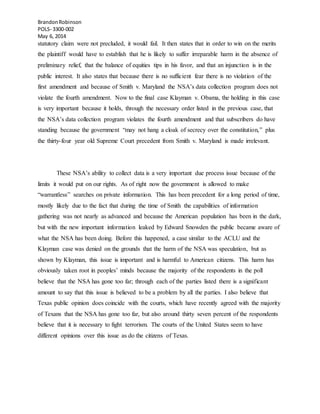Survey_Lab_Poll_Analysis
- 1. BrandonRobinson POLS- 3300-002 May 6, 2014 Survey Lab Poll Analysis Texas public opinion on the NSA data collection program
- 2. BrandonRobinson POLS- 3300-002 May 6, 2014 The Texas Tech Department of Political Science conducted a short research survey about issues facing Texas. This survey had many questions, but I will be focusing on a select few giving the results of the questions and explaining what they mean. For my research I will be focusing on gender, political party, and whether people believe the National Security Agency (NSA) is necessary to fight terrorism or has gone too far in violating peoples’ rights. I will split the respondents by gender and then explain how Republicans, Democrats, Independents, and others answered the NSA question. The main point of my study will be to research this due process issue by looking at public opinion in Texas and by analyzing court cases that gave the NSA the ability to collect everyone’s telephone records, as well as information on the date and location of your phone calls, and cases that are current and address the due process rights of American citizens. I will also be looking to find the answer to several questions: Within the male and female populous do certain parties favor the NSA and the taking away of certain due process rights? Do the respondents favor the NSA or does the majority believe that they have gone too far in violating peoples’ rights? Does gender play a role in favoring a side in the NSA debate? When it comes to the male respondents the majority, or fifty seven percent, of all of the males answered that the NSA has gone too far in violating peoples’ privacy rights. Breaking it down into party, fifty five percent of the Republicans answered that the NSA has gone too far. The Democratic male respondents were basically split down the middle between believing the NSA was necessary and that it has gone too far. The Independents majority containing fifty eight percent answered that the NSA is violating citizens’ due process right to privacy. Lastly, sixty seven percent of male respondents who were in some other party, answered that the NSA has gone too far. This shows that Democratic males from Texas were the only party where the majority did not think the NSA is violating privacy rights. When it comes to the female respondents the majority, or fifty six percent, of all of the females answered that they believe the NSA program goes too far in violating peoples’ privacy rights. Breaking it down into party, fifty seven percent of Republicans, sixty one percent of Independents, and seventy one percent of female respondents who identify with some other party all answered that the NSA has gone too
- 3. BrandonRobinson POLS- 3300-002 May 6, 2014 far. But once again, the Democratic Party is split. Looking at this data some of the questions can be answered; this data shows us that the majority of Texans both male and female believe the NSA has gone too far in violating peoples’ due process right of privacy. Also, the majority of parties believe this as well, except for the Democrats who are practically split in the middle with half of the respondents who identify with that party saying that the NSA’s collection of everyone’s telephone records, as well as information on the date and location of your phone calls is necessary to fight terrorism. Looking at both male and female respondents separately, the only distinction is that the women are slightly more inclined in each party to believe that the NSA has gone too far, but the bottom line of these results is that it shows that the majority of Texas citizens do not agree with what the NSA is doing. This shows that there is some controversy on the NSA topic, so let’s look at some of the court cases giving the NSA the ability to do what it does and current cases that are challenging the NSA. For my research I will look at three court cases, Smith v. Maryland, which is the backbone case for the NSA, American Civil Liberties Union v. James R. Clapper, and Klayman v. Obama to show the court’s opinion of what the NSA does. The court decision in Smith v. Maryland (1979) is the center stone of The NSA’s data gathering because the Supreme Court’s holding in this case is that the individual does not have a reasonable expectation of privacy. What this does is allow the government to get information from the “third party” telephone companies without the individual’s permission or without informing them that the data will be taken. This case, which started with a single incident that made legal the installation of a pen register to stop a man from harassing a woman, to now be construed to allow the government to basically have pen registers on every single person, innocent or not, at all times. The second two cases that I will be discussing are current cases that are working their way up to the Supreme Court. The first case ACLU v. Clapper, which involved an organization trying to sue the government for getting information on them through the telephone company they subscribe to. This case is dismissed based on its standing, the government by way of sovereign immunity has precluded suits by the subscribers of the telephone companies; the only way the government could get sued for this is if it was by one of the telephone companies that the government was requesting data from. This case also goes into the merits of the case and rules that even if the
- 4. BrandonRobinson POLS- 3300-002 May 6, 2014 statutory claim were not precluded, it would fail. It then states that in order to win on the merits the plaintiff would have to establish that he is likely to suffer irreparable harm in the absence of preliminary relief, that the balance of equities tips in his favor, and that an injunction is in the public interest. It also states that because there is no sufficient fear there is no violation of the first amendment and because of Smith v. Maryland the NSA’s data collection program does not violate the fourth amendment. Now to the final case Klayman v. Obama, the holding in this case is very important because it holds, through the necessary order listed in the previous case, that the NSA’s data collection program violates the fourth amendment and that subscribers do have standing because the government “may not hang a cloak of secrecy over the constitution,” plus the thirty-four year old Supreme Court precedent from Smith v. Maryland is made irrelevant. These NSA’s ability to collect data is a very important due process issue because of the limits it would put on our rights. As of right now the government is allowed to make “warrantless” searches on private information. This has been precedent for a long period of time, mostly likely due to the fact that during the time of Smith the capabilities of information gathering was not nearly as advanced and because the American population has been in the dark, but with the new important information leaked by Edward Snowden the public became aware of what the NSA has been doing. Before this happened, a case similar to the ACLU and the Klayman case was denied on the grounds that the harm of the NSA was speculation, but as shown by Klayman, this issue is important and is harmful to American citizens. This harm has obviously taken root in peoples’ minds because the majority of the respondents in the poll believe that the NSA has gone too far; through each of the parties listed there is a significant amount to say that this issue is believed to be a problem by all the parties. I also believe that Texas public opinion does coincide with the courts, which have recently agreed with the majority of Texans that the NSA has gone too far, but also around thirty seven percent of the respondents believe that it is necessary to fight terrorism. The courts of the United States seem to have different opinions over this issue as do the citizens of Texas.



